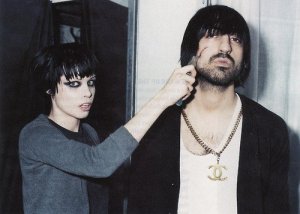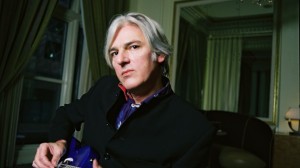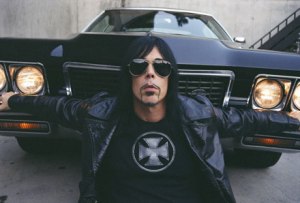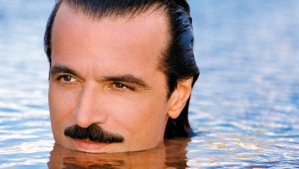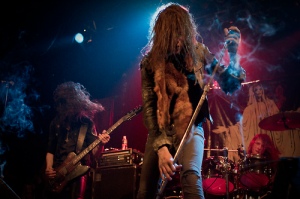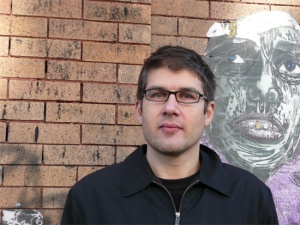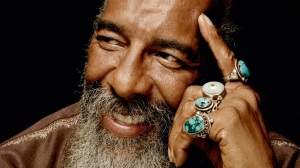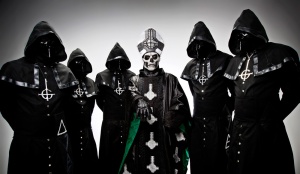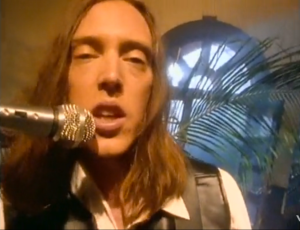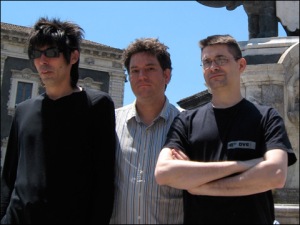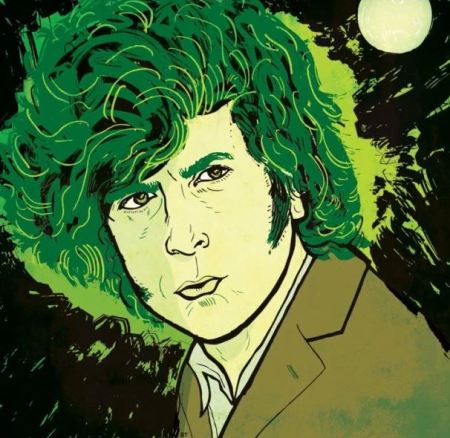
Illustration © 2013 by Brian Taylor for the Boston Phoenix
In his new book, Supernatural Strategies for Making A Rock ‘n’ Roll Group, Ian Svenonius lays out a plan for a neophyte intending to enter the world of competitive rock. “If one makes a rock ‘n’ roll group,” he dutifully explains, “one must eventually make some music. But before that, one must make a photograph of the group.” Svenonius is no stranger to using humor to subvert rock ideologies towards his own post-modern polemics, having fronted seminal DC post-punk units Nation of Ulysses and the Make-Up. With this current tome, as with 2006’s penetrating The Psychic Soviet, Svenonius slyly investigates how this “rock and roll” came to have such power over our minds and souls.
In both of your books, you talk a bit about nostalgia and planned obsolescence. It seems like with classic artists, there’s this cognitive dissonance people have: they hate them because they’re so old, but on the other hand they love them because they’re so successful. You know, the Rolling Stones, the Who, Paul McCartney, etc.
That’s interesting. The first generation of rock and roll, there’s still people living from it, there’s always going to be this genuflecting towards the elder statesmen. And it gives people this real sense of security, that the early prophets are still among us. People feel this continuity and old people feel relevant because rock and roll is the prescribed rebellion for this culture. It’s very institutionalized as a rebellion, rock and roll, it’s a really singular phenomenon, with very specific codes for rebellious behavior.
I mean, if you are a rock and roll performer, there’s this constant pressure to create excitement, to create spontaneity all the time. It’s very weird! And it makes people feel comfortable to see old stars still alive. But at the same time, when the Who played the Superbowl, there’s something so horrible about it. And especially to all these young people who probably don’t know who the Who are.
Well, people always say “No one knows who the Who are”, but when I was a kid, 10, 20, 30 years ago, I didn’t know about music from fifty years ago. But now, kids do know quite a bit– maybe more than they should!
Oh yeah, I agree, they know a lot! And I keep waiting for the moment when rock and roll’s going to turn a corner and go the way of, you know, traditional jazz, where there’s nothing to grasp onto anymore for people. That still hasn’t happened, somehow the marketing still works. Like the Beatles are successfully re-marketed every couple of years, with some new anthology or scrapbook, and it keeps revitalizing their memory. Or maybe it’s more about the way that every generation is beholden to the older form.
I mean, when you watch film, old film, even silent film, it’s still recognizable, because Hollywood is so in love with itself and in thrall to itself and it keeps repeating, and rock and roll is kind of like that. Whereas if you play a blues 78, or some big band tune, that seems so amazingly remote to most people. People can’t find the connection. Whereas yeah, the Who continue to seem modern to people, and I’m not sure why.
In your new book you sort of explain it when you say “Humanity has a difficult relationship with time.” I mean, fifty years, two hundred years, five years, we don’t really know what these spans mean when we listen to music, especially when it has to do with the pull of nostalgia.
Well, rock and roll is supposed to be about newness, a momentary trend. In the beginning of rock and roll, there’s so many songs that are like “Rock and roll is here to stay.” It’s a real adamant sentiment; there aren’t a lot of cha-cha songs that were like “Cha-cha is here to stay”! So rock and roll was at first a thing for very small children, and they had this obstinate idea that “This is now the paradigm.” And it makes sense, because rock and roll is hard to define– and for all of its conventions, the form is so plastic, you can do anything with it. If you go to the rock and roll section of a record store, the records have very little to do with each other, it isn’t really a genre. So you think “Well, what is it?” And the thing you always hear is “It was stolen from black culture.” But rock and roll is so universal, this ritual music, and it’s perfect in the way that cave paintings are. It’s just expression, it’s just expression. And it was introduced through African-American culture in this country, but it’s also this really universal idea, it resonates with people all over the world.
But at the same time, and you talk about this a lot in The Psychic Soviet, rock and roll is in a sense just part of capitalism and planned obsolescence, with the obsession with newness as just a way of making people feel that they need to buy new things all the time, under the guise of a people’s cultural rebellion.
If you’ve read Soviet propaganda about rock and roll, you see that they recognized rock and roll for what it was. I mean, if you read the propaganda about Elvis Presley shaking his hips, you’d think that people hadn’t had sex before, that it was an introduction to sexuality. The claims to rock and roll are so absurd and insane! In a sense, rock and roll introduced a more repressed sexuality. The Twist is a good example, all the rock and roll dances where people danced apart. Before that, like say in the Jazz age, you’d dance with a bunch of people and couples would close-dance and it was a very sexual thing. With the Twist and these mechanized post-industrial people-acting-as-machines, it’s a real repressed sexuality that rock and roll proposed. It’s funny that the conceit of rock and roll is sexual liberation, but in a certain sense it was the opposite. It’s actually this weird– it’s almost like the boom of strip clubs in the age of AIDS.
Right– you talk in both books about the differing sexual appeal of the Beatles and the Stones, and how the Beatles were almost beyond sexuality. Which makes sense if there was a time that dancing was a gateway to hooking and the shift to rock concerts changed that dynamic to be a room full of people focusing their sexual desire to an unattainable artist on a stage.
I definitely think so; I mean, jazz musicians were sexy and all, but this hysteria as a stand-in for sex was a later concept. Although that didn’t start with the Beatles: there’s a famous documentary of Paul Anka from ‘61 and the hysteria is exactly like Beatlemania. What’s interesting to me is the way that women wanted to rip these people apart; this idea that these artists were terrified of being caught by their fans because it would mean certain death. That’s a really weird idea! This mass hysteria, repressed sexuality, etc.
It kind of seems as if pop culture hit some kind of oil spigot glut, accidentally, and it went all out of control, and we’ve spent the next fifty or sixty years obsessing over it: “How did this happen?” “How can we make it happen again?”
Right! And the Beatles are a great example because when rock and roll started, it was this thing for hustlers and the mafia and it was pure exploitation. A lot of the early rock and roll moguls were just really young guys, or black or female, and it wasn’t that fifties corporate structure or anything. But with the Beatles, you saw it go corporate, that was the beginning of the end, in a way. And they started filling stadiums and blah blah blah, and there’s this nostalgia for that moment where it began, before it got lame. I mean, even from the beginning there were all these songs about dead stars, basically obsessing about the garden of Eden, when it was “pure”, and the fall. And everyone has their own idea of what the fall was; now you talk to people who think that the nineties were a pure moment.
Right! Irony-free, like that New York Times editorial.
Which New York Times article?
Oh, it was this piece a month or so ago where this writer posited that we are crippled by irony in our modern times, and in the piece she pointed to the 90s as a particularly irony-free decade.
Well, that’s a great example of total revisionism. There are a lot of histories coming out now of musical eras that I remember first-hand, and whenever I read these it just reminds me that history is just so completely plastic, because the accounts are always unrecognizable. I mean, the 90s being irony-free, that’s a great example. I mean, whatever. Punk rock, for example, is idealistic, or so people think; in reality, it was full of smarmy Touch And Go people, that whole perverse contrary mean-spirited thing happening. Anyway, whatever. That’s funny.
But yeah, yeah, but it’s interesting too, a big part of this nostalgia thing is that you can lay it at the feet of the Beatles and the Stones and these people who were talking all the time about their forebears. They were constantly going on about these people, and a big part of it is that if people are dismissing you as fluff, you have to create a context that you come from that feels authentic or legitimate. And for those guys, it was America, and/or black or country people, so they needed to show this genealogy that their music came from. And to their credit, they didn’t have string sections or that sort of thing, the sort of things that would legitimize them to non-rock and roll people, so they had to say “Oh, look, Buddy Holly.”
Or kind of like the way the Rolling Stones trotted out Howlin’ Wolf in their early days.
Right! Exactly.
I mean, when the Stones brought Howlin’ Wolf to play with them on Shindig in ‘65, he wasn’t even really that old or bygone, but they presented him as if he was this far-out old man from another planet.
Yeah, totally. And to their audience, he was just this weirdo guy, so they were placating the connoisseurs and the mods who knew the origins of the music, but they weren’t threatening their own type from their scene. And you know, the way that they changed the music was such that no one wanted to hear the original. And you still mean people who only want to hear the British covers of old blues songs. And there’s a real difference between the two, even when it’s hard to pinpoint. It’s this real value issue.
Ultimately, rock and roll motivated young people to want to start groups. It’s something that you address in your new book, which is ostensibly a guide to forming a group even if it’s really more of a warning or a missive of discouragement in disguise. Now, you and I both kind of know the answer, but why do people form groups?
Well, part of it is people’s powerlessness and alienation, as corny as that might sound. People feel powerless and our society is totally alienating: we have this absurd political system with this symbolic non-vote every four years for some corporate party that’s identical to the other one, and the political system doesn’t address any actual issues. Our official art forms, television and film, are completely insane and have almost no relationship to anything anyone would want to see, just a grotesque spectacle instead. And our entertainment is supposed to just be shopping. So rock and roll groups are a way of having a community or something, and that’s why a big part of the book talks about gangs.
A group is a descendant of the gang, but it’s also a love affair with yourself, a way that you can focus on yourself. People would call it narcissism, but it’s not necessarily that, it’s more of a romantic thing. It’s romantic because it’s an idealization of what the world should look like. And it’s also part of this conceit of Americanism being outside of the mainstream, a rock and roll group is supposed to be this outsider force, and that once again pertains to this whole gang conceit, you know, “We’re outsiders!”
In The Psychic Soviet, you have a chapter that gets into the imperialist nature of the rock and roll band, that you are not a real band unless you have a vehicle and all this equipment and you assault the country with your music. Over various campaigns you conquer this state and that state, and it’s hard to actually feel like you exist, as a band, unless you do that. Where did that come from, what’s that all about?
Well, I read this book called The Violent Gang by Lewis Yablonski, it’s this sociological book from 1959 and it has lots of great interviews with gang leaders who are fourteen year old guys talking about rumbles and whatnot. They talk about their campaigns and wars against rival groups, and it’s just great because it’s so reminiscent of bands and this sort-of fantasist world view that groups have, which is no matter how insignificant your group is, or unpopular, there’s always someone writing in from Germany saying that you’re the greatest. You know, the groups, the whole thing, they all need each other to a certain extent. By saying “unpopular”, I’m not trying to be dismissive; there are a lot of great unpopular things, and most popular things are terrible. So when I say that, I’m not being cynical or mean, but it’s just a fact. And part of the rock and roll idea is “Oh, the Velvet Underground.” You know, they are the thing that keeps everybody going, because nobody knew that they were so great, but they were so great.
Well, that, and the idea that you can be a band, and exist, and no one likes it or appreciates it, but that twenty years later you could become somehow influential.
Right– the Stooges are also a great example of this as well.
Yes; and importantly, for a band of a certain mindset, that the goal isn’t instant adoration but this elusive becoming-influential-decades-later that you can’t intentionally make happen.
The problem with the whole Velvet Underground or Stooges myth is that they were actually heavily promoted industry bands. By that point, where those bands were at, you are already in the very corporate phase of rock and roll music. All of those bands were very connected, they had the New York machine working for them. And one thing you have to remember about groups is that the marketing for them is the myth of the outsider, you know? Like every Velvet Underground fan still thinks that they’re an outsider because they like this band, this band that has probably sold tens of millions of records. How “outsider” is that, really? They’re of the establishment but they profit from this mystique.
You talk, in your book, of groups having ideologies; people, in order to buy into a band, need to buy into an ideology, whether said ideology comes from the group itself or if someone makes one up for them. How important is this ideology to people’s appreciation of music?
Well, I dunno. The ideology for groups right now seems to be about being wealthy or something; being carefree and cool. But it always changes. For a group to be successful right now, it seems that there has to be this kind of– I dunno, every phase in rock and roll seems very much motivated from outside. Like the folk movement in the late 50s, it was all about Harry Smith, he puts out his anthology and it has an enormous influence of popularizing folk music and archaeology of folk songs, gives them a reach and magic hipster element beyond what Alan Lomax did prior. And then the Nuggets thing for punk, and the Velvet Underground reissues in the 80s for college rock. And books too, a book can come out and completely change me. Like the book Please Kill Me had an enormous effect on the way people thought about rock and underground rock; that book was huge.
What do you think the change was with Please Kill Me?
Well, now every band sounds like the Ramones, and no bands sounded like the Ramones before that book came out. In a way, I think the book is really so great, but it has a very specific worldview, a very specific value system, an ideology that it proposes. It’s basically latently conservative, this whole “partying” thing. It’s very conservative, in a sense.
Do you think popular musical movements are always going to have this drastic swing between music that is considered “radical” and that which is “conservative”? Especially the way that so much music is sort-of secretly conservative, conservative in a coded way. I mean, someone like Iggy Pop, or the Ramones, as being part of a conservative musical movement, because they were so “shocking”!
Well, if you read someone like Dan Graham— in the punk era, he wrote about the Ramones as if they were this cunning deconstruction of conservative values. But they’re just a bubblegum band, and he’s mistaking their intent as this real arty thing. It’s interesting. It’s kind of– I mean– I guess– I’m sorry, can you ask your question again?
Well, I guess what I’m really asking is is there something inherently conservative about sticking around for a really long time playing music, turning your music into a brand, something easily recognizable and identifiable. Is that “conservative”?
Well, I don’t know, because I think that the whole idea of rock and roll as being this youth thing– from the time I was a child, all I ever heard about the Rolling Stones, my whole life, is how old they are. And it’s like give them a break! Because we let Miles Davis get old, we let Howlin’ Wolf get old and play music. It’s kind of absurd, especially because when you do see old people play music, they’re usually pretty good, they’ve learned something over the years. I mean, if you see Al Green play, he has such mastery and presence. I’m sure when he was young and lithe there was something else going on, but he’s great. And I don’t think it’s conservative to keep playing music into your old age, actually I think it’s a rebellious action because society has such disdain for it. So in a contrary sense, people are so disdainful toward– our country only respects success, or I should say they only respect success based on monetary or chart success. If you try to tell your family that you’re an artist or a poet, it’s pathetic. After your 26 or so, I mean.
I do think that rock and roll might be inherently conservative, though. Because it’s based on a lot of ideas of– it’s so stuck up it’s ass, I guess. It’s hardly revolutionary, I think. It’s stuck up it’s ass in the sense that it’s constantly referring to itself, and every permutation is– if it’s not about some new gizmo, like jungle music or some new drum machine, it’s usually based on getting conservative. It’s a lot like religion, where the new movement is always “Let’s get more strict!” “Let’s bring it back to basics!”
That’s so true. People always love back to basics. It always makes people so happy. “Oh, I hear AC/DC’s next album is going to be ‘back to basics,’ thank fucking god!” And you think “Oh, that sounds rad!” But in a sense, is getting what you want, or promising people what they want, a conservative thing?
Well, I think that this is what it really is: what it really comes down to is the initial idea of rock and roll, the thing that people are always looking for, that they’re nostalgic for, is this kind of ur-expression. When you see Jonathan Richman throw his guitar or whatever, that’s the kind moment that everyone is looking for, as corny as it sounds. That’s what people want, that spontaneity or that sense of spontaneity even if it’s been done a thousand times. That’s what people find so thrilling. Whenever people say “back to basics” they don’t mean “back to the original thing”, they mean back to primitivism. The cave painting thing, like when people discovered it in America it was so powerful. I think it is this exploding American culture, or really capitalist culture, all over the world. And it has its nefarious uses but at it’s root it’s really universal, and the reason it’s so freeing is that before rock and roll, there was a thousand years of honing the craft and showing off sophistication, and then rock and roll happened.
But who know, maybe that’s not it and maybe it’s just really all repressed sex. I mean, people can’t stand the idea of parents or grandparents having had sex before, everyone wants to think that they actually discovered sex. It’s painful for people to think about historical sex. Rock and roll is just another way of people convincing themselves that they discovered sex, when in fact it’s this really repressed pantomime. Now, sex is also so codified and regimented, and everyone’s got their sex identity that’s so incredibly strict. It’s this thing we’re going through right now, it’s bizarre.
In your book, you write “When the young attain some agedness, their favorite group from their youth is a nostalgic memory central to their identity, and considered with a kind of irrational devotion, like Catholicism to a Catholic.” This description of rock as an “irrational devotion” seems apt; a lot of 70s rock, for example, expressed rock as a past movement that they were adhering to, like Led Zeppelin’s “Rock and Roll”.
Oh right, it was all nostalgia for the 50s. And 70s glam was doing this incredibly camp– and that was what punk was, when punk arose it was just another version of this glam thing but because back then things were more apt to name things… I mean, punk was the last movement that could be named, right? Except maybe hip hop. But you can’t really call anything anything anymore, mostly because Americans hate pretense and are so hung up. I mean, like Americans don’t really have nicknames, or at least white Americans. Why is that? I think they’re just fucking hung up, nothing can have a name because it’s like “Oh, that’s goofy.” It’s incredibly repressed, and then you end up with these stupid terms like “indie rock”. It’s this all encompassing term that represents like thirty years of music…
Hah! Speaking of repressed musical movements.
Absolutely. Well, it’s afraid of expression, there’s no expression in indie rock, it’s all obfuscation. It’s really cowardly music. Now, we have to define our terms because a lot of what would be called “indie rock” I really like; I mean, I have an idea what it is, but you know. Anyway, there’s definitely a lot of underground music, it’s like wow, this has no gumption, there’s no personality.
I have a section in the book on drugs, on how people can define musical periods through drugs and there’s this pharmaceutical era where drugs are a corrective. And in a sense, a lot of what’s called indie rock is this whole “Oh, this is correct” thing, like “Oh, they got it right!” Like indie rock was correcting prior wrongs. Whenever you’re too adherent to some form, it’s the personality that’s missing. Like nobody thinks about John Mayall and the Bluesbreakers as having personality because, um, he just loves the blues. Right? It’s like a lot of bands now, you listen to them and it’s like “Oh, you just love My Bloody Valentine.” There’s no personality to liking My Bloody Valentine.
People nowadays seem to get that personality fix from celebrity chefs instead of rock stars.
Right– I mean, chefs that you know of are supposed to be drug-addled, supposed to be macho, or control freaks, all the stuff people think of when they describe “genius”. It’s the way that the Internet has cheapened everything– the only thing that you can’t cheapen with the Internet is a meal, because you can’t actually eat the Internet. And also people have been made so stupid by industrial consumer society that nobody knows how to fucking cook, and they don’t really want to know how to cook, they just want to watch somebody else cook, it’s like watching a magician or something. That’s very similar to the creation of the rock star: really, anybody can sing, but this guy is the special person.
Right, like Eddie Van Halen facing away from the audience when he started out so no one could see how he did it.
Right– I mean, that sort of thing is great theater. I mean, I’m sure lots of people hammered-on before, but that’s great theater. And that’s the thing about rock and roll, in this whole downsizing time, all the old arts, the lively arts, were replaced by rock and roll because they were too expensive. And now, everything’s about slave labor, and you can’t have a theater production because you can’t pay people slave wages. Punk, more than anything, degraded people’s wages in terms of music, because according to its rules, a group drives hundreds of miles to play music for people but they can’t charge more than a few bucks for someone to see them. Rock and roll, really, is the beneficiary of all the cheapness of this society.
Right! I love this book from a few decades ago called Rock and the Pop Narcotic by Joe Carducci; it’s a great book, although he’s kind of right wing, at least according to the stuff he says in this book. But in Rock and the Pop Narcotic, he says that rock is a democracy, because it takes the old music machine, and you use electricity to pare it down to just the players. Get rid of the orchestra, get rid of the outside songwriters, get rid of the arrangers and Tin Pan Alley, and it’s just a self-directed self-motivated small group of players in charge of their own destiny. And the older I get, the less true I think of this theory of this being some pure democratic ideal.
You know, as far as democracy, it’s kind of back to the major label system nowadays except instead of major labels it’s publicists. It is like our democracy in a sense because everything is bought, public opinion is purchased. But I don’t know– the idea of a band being a democracy, hmm. I don’t know!
In your book, you don’t seem to think that a band where each member has equal representation is a recipe for success.
Hah! Yeah, that’s true. I mean, honestly, the book is written in such a flippant way…
You have a section of the book where you compare three music documentaries– The Beatles Let It Be, the Stones One Plus One, and Metallica’s Some Kind of Monster— in terms of the way that these films show the intra-band communication. What’s the message in comparing these films, and what does the Metallica film say in terms of how things have progressed to now regarding band communication?
Hah– I dunno, I mean, with that Metallica film I’m just so impressed that they released that thing. You watch it and you wonder whether the band is really deluded about how the film looks, or if they are just really cool in being willing to be so vulnerable. It’s just wild. I don’t know if it’s “cool”, it’s more just wild. But the same way with the Beatles; everyone watches the Let It Be movie and they’re like “Oh, oh, it’s so depressing!” I mean, what’s so depressing about people talking about arranging a song. It’s really weird.
If anyone watching Let It Be had actually recorded a song themselves, they might not think the movie is that depressing.
Exactly! It’s such a weird idea, like is everyone on Prozac? It’s such a weird thing to me, the idea that that movie is some harrowing emotional journey. I mean, anyone who’s been in any kind of relationship at all shouldn’t find Let It Be that weird. But yeah, that Metallica movie, it’s all reality tv, the way they let it all hang out.
But it’s not salacious for it’s own purposes– the film shows how cornered they were at that point. Like the scene where they are being asked to do this lame radio promo, and their manager is like “Yeah, you have to do this, or else these radio stations won’t play you.”
Yeah, totally. Basically, every group that attains that kind of success, then people get into the money thing. Like that Beatles book, You Never Give Me Your Money. I mean, now that people have given the Beatles their love, now they need to rip them apart. It must be this forty year hangover or something. Like that book, or Lennon Remembers; printing this guy’s rants, how weird that that’s what people want from the band.
People love the songs, but people also love the ego clashes, in terms of what they get out of music, or what they get out of artists.
Oh totally. And maybe that’s what Metallica felt was missing. Maybe Some Kind of Monster was this canny thing, like they got together and were like “We don’t have this Mick and Keith soap opera attached to our group; let’s introduce it now.” Or Phil Spector being a psychotic; it’s like a way to inject that kind of drama into this group that– I mean, I’m not a Metallica fan, so I wasn’t aware of their personalities, but now I am! And now, the narrative of the group becomes more poignant.
It’s kind of like watching the Olympics nowadays: before they show the ski jump or whatever, they need to tell you that their mother used to drive them to practice at 3 in the morning, and that they broke their leg last year and because of that this jump right here is really crucial, and suddenly you care when you didn’t before when you were just watching a sporting event.
Right. it’s called mind control.
Having written these books, do you feel like you were personally manipulated by music and its culture? Are these books written to address concerns of why this was so important to you, why it continues to be important to you?
Oh yeah, that’s what the books are about. The new book is addressing potential group members– and I’m not really talking about the great appeal of the group, because everybody knows that, it’s been bashed into your head by cultural programming. So if this is a cult, this is a pre-deprogramming guide. There’s a lot of hurt feelings in rock and roll, because people really never recover from a group. It’s like drug addiction, you can be saddled with it forever.

